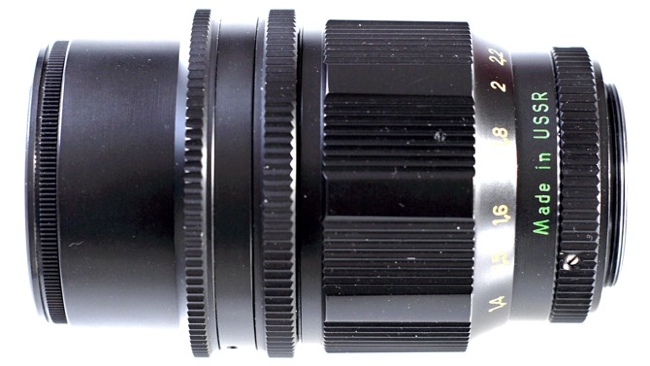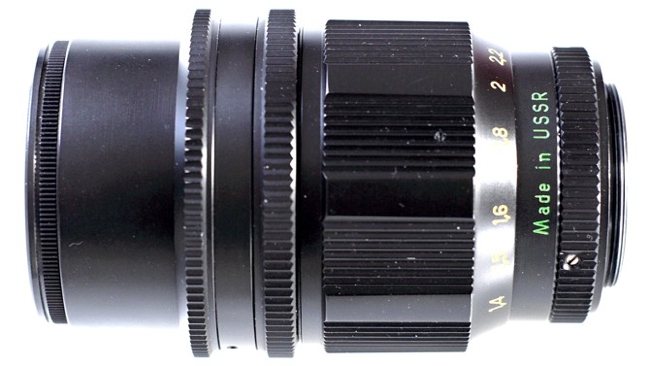
 Vintage russian lens
Vintage russian lens
Cheap or vintage lenses, filters and poor focus can easily downgrade your 4K camera's performance to HD or worse!
was recently privy to a conversation in which someone first expressed an interest in the saleability of 4K production, then moved on in the next breath to an enthusiastic discussion of classic lenses and diffusion filtering. The creative direction was obvious: the production in question is set in the 1930s, and a crisp, sharp, modernistic style would clearly have been inappropriate. But artistic concerns aside, there might be a need for a reality check here, because while it's been normal for decades to produce material for 2K-ish output – by which we mean 35mm for the big screen – higher resolutions than that are only now becoming common, and not only at the high end where people are best equipped to deal with them.
A 4K digital image, as we've said many times, is sharper than most people are used to seeing from the traditional 35mm photochemical chain. It's sharper than almost all current movies. It's about as sharp as a moderately-good DSLR image. The inevitable result of this is that the demands on the rest of the imaging chain – from filters to lenses to focus pullers and all the rest – are consequently higher. This should be obvious, but I have discussions where it's overlooked all the time. So, if there was any doubt, let's be clear: shooting your movie on lenses which survived the Russian revolution probably isn't going to get you a 4K finish, no matter what camera is behind them.
Of course, a large amount of this is political. Early attempts at 4K cameras were more 4K in name and output resolution than they were in actual resolving ability, and this is an article intended for people who like to peer scowlingly at monitors while wearing magnifying spectacles as opposed to those for whom 4K is a soundbitten selling point. You could, if you wanted, take the position that you're somehow resolving the softness and aberration of old glass, or the glow of a diffusion filter, more faithfully with more pixels. Even so, some of the traditional advantages of higher-resolution shooting – the option to crop and stabilise and reframe – are still denied to filmmakers whose cameras are capable of more than their glass, so it's worth keeping in mind.
Let's consider a few issues which can reduce the effective resolution of cameras:
Camera movement
Motion blur is still blur. Unless the camera manages to describe a path of motion separately in two perpendicular axes within the same frame – which is possible in circumstances of extreme vibration but probably fairly rare in practice – this will not have the same effect as soft focus or a postproduction kernel blur. But the ease with which the precision of a 4K frame can be disturbed by motion blur is alarming, and handheld photography, even with short shutter times, is a good way to compromise perceived resolution.
Filtration
Any piece of glass placed between a sensor and the scene will reduce resolution because there is no such thing as zero-diffusion glass. As a purely practical matter, the effect is usually small, but it's not difficult to find someone willing to claim that their pet brand of filter offers a better compromise than the competition. All the same, the real issue here is diffusion and low-contrast filters, effectively all of which compromise resolution to at least some degree above the baseline.
Compression
The new Panasonic GH4 offers a 200 megabit recording option, which sounds good until we realise that at four times the pixel count of HD, that's only the same bitrate per pixel as a 50-megabit HD image – the minimum considered broadcastable in many places. Okay, it isn't necessarily as easy as simply picking a number out of mid-air, and most codecs have better-than-expected performance when scaled to larger resolutions because they try hard to specifically allocate precision to high-contrast edges where it's most useful. Even so, it's important that producers aren't encouraged to believe that really excellent 4K can be had with no real data-wrangling penalty over HD.
Focus
Well, fair enough – this one is nothing if not obvious, but it's worth mentioning anyway. The sort of productions which are most likely to be using lenses of less-than-stellar performance and camera systems which compress heavily are probably also those which will struggle to afford to put a real top gun on the follow focus. This is perhaps the point at which the smaller sensor and excellent sensitivity of a GH4 might start to look quite attractive, even though noise-versus-size issues also imply wider apertures for the same cleanliness of image as we discussed recently in an article on interpretations of sensor size. Nevertheless, with the current fashion for short depth of field and energetic camera movement, the feasibility of keeping a 4K image sharp is frequently in question.
Lenses
This one, at least, is well known. But there are interrelated problems: stills lenses in the common mounts are often sharp enough for 4K and are probably the most affordable way to buy that capability. They're not easy to focus on moving targets, though, without significant extra hardware, and lens adaptors with optical components – or adaptors which are simply not very well made – can compromise the situation further.
Of course, experience, knowledge, and quality equipment have always been required for really excellent results, and this will remain the case for the forseeable future. I'm also vividly aware that I'm not going to persuade anyone to start selling their Blackmagic Production Camera as a 2K device because they can't afford the best lenses. 4K acquisition will almost always look better than HD, especially once scaled down, and notwithstanding like-for-like changes in noise and dynamic range at higher pixel densities. But let's not get trapped in the simultaneous assumption that we can shoot images onto cheap SD cards using cheap 1970s glass on cheap DSLRs, and get results out of it to which we can apply a 200% zoom and still have it look good on the big screen. You'll probably get better results by taking out a good HD camera and spending the difference on better glass.
Tags: Production


Comments